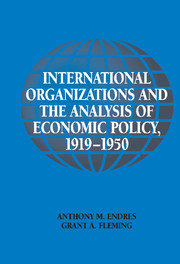Book contents
- Frontmatter
- Contents
- List of Figures and Tables
- List of Abbreviations
- Preface
- 1 Economics and Policy in International Organizations: Introduction
- 2 Business Cycles: Conceptions, Causes, and Implications
- 3 The Role and Conduct of Monetary Policy in the 1920s and 1930s
- 4 Public Investment Programs in the Interwar Period: Pre-Keynesian, Proto-Keynesian, and Keynesian Perspectives
- 5 Trade Policy Research: Geneva Doctrine and the Scandinavian Connection
- 6 Social Economics at the ILO: Scope, Content, and Significance
- 7 International Finance and Exchange Rate Policy
- 8 The Full Employment Movement from the 1940s
- 9 Conclusion
- References
- Index
9 - Conclusion
Epilogue: Investigating Economics and Policy Analysis in International Organizations
Published online by Cambridge University Press: 29 July 2009
- Frontmatter
- Contents
- List of Figures and Tables
- List of Abbreviations
- Preface
- 1 Economics and Policy in International Organizations: Introduction
- 2 Business Cycles: Conceptions, Causes, and Implications
- 3 The Role and Conduct of Monetary Policy in the 1920s and 1930s
- 4 Public Investment Programs in the Interwar Period: Pre-Keynesian, Proto-Keynesian, and Keynesian Perspectives
- 5 Trade Policy Research: Geneva Doctrine and the Scandinavian Connection
- 6 Social Economics at the ILO: Scope, Content, and Significance
- 7 International Finance and Exchange Rate Policy
- 8 The Full Employment Movement from the 1940s
- 9 Conclusion
- References
- Index
Summary
In Chapter 1 we portrayed economists engaged by international organizations as practitioners of “international political economy,” subsequently defined in the Schumpeterian sense as including the articulation of a set of economic policy recommendations or policy orientations advocated on the basis of certain underlying normative precepts. We set the objective for this book to produce an account of the economic thought of economists associated in one way or another (as employees, consultants, advisers) with international organizations up to 1950. Usually, the ideas of these economists were developed in response to policy questions – questions connected directly with government action – established by resolutions and recommendations of the governing bodies and conferences of respective international organizations.
A more specific expositional objective was to accept from the outset the value laden content of research work on policy questions in international organizations and then analyze as a separate matter, the “unifying principles,” as Schumpeter (1954: 38) called them, underpinning policy proposals. Moreover, we were interested in considering the uniqueness and distinctiveness of analysis undertaken within the locus of an international organization, and the extent to which associated economic doctrines supported or invalidated particular lines of approach adopted by policy makers. When reviewing explicit or implicit advocacy contained in a piece of analysis or research work surveyed in the foregoing chapters it must be borne in mind that historical accounts or reconstructions analyze the character and content of economics as applied to policy issues at one remove from the motives of those who produced the analysis.
- Type
- Chapter
- Information
- Publisher: Cambridge University PressPrint publication year: 2002



